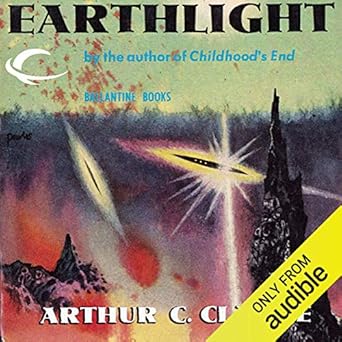
![]() Earthlight by Arthur C. Clarke
Earthlight by Arthur C. Clarke
Arthur C. Clarke is one of the most influential writers of science fiction. His quiet optimism, faith in science, and ability to tell straightforward but intriguing tales endeared him to a generation of fans that continues to this day. Earthlight, his sixth published novel, follows directly on the heels of his successful Childhood’s End, and though rather simplistic in presentation, adheres to the author’s style in perfect fashion.
Earthlight is the story of Bertram Sadler, an undercover agent for the CIA sent to the moon to ferret out a suspected spy. Though dependent on Earth for all of their metals, several of the solar system’s planets have been inhabited and are united under the banner of The Federation. Tungsten, uranium, and the like are all in short supply and prices on Earth determine much of the solar system’s economics. A rebellion is fomenting in the face of price hikes on Earth and the CIA believes a Federation agent at the moon’s observatory is leaking information. It is up to Sadler to discover who and stop them before war breaks out.
Told simply but subtly, Earthlight is not complex space opera. Set entirely on the moon, the book is largely a vehicle for Clarke to describe what inhabited life might be like on our orbiting globe. Featuring monorails, sports in light gravity, underground mining operations, and a telescope larger than any on Earth, the imagery is vintage Clarke. So too are the characters. Scientists with starched collars and thin ties fill most of the main roles. The story is rooted as much in ideas as in visuals, and a current of hard science flows through everything.
Showing his usual insight into humanity’s vices, Clarke likewise seeks to promote its virtues. Fighting for resources is an unquestionable aspect of real life, and so it is in Earthlight. The climactic scene revolving around this, which occurs about 80% of the way into the book, is spectacularly depicted and will have sci-fi junkies drooling. Soft science fiction fans will likewise find something to especially enjoy in the remaining 20% of the story. Clarke bets on mankind’s empathy, and the manner in which the Earth and the Federation’s interests are resolved nicely balances the fireworks of the climax. Whether it’s believable or not is up to the reader.
Problems with Earthlight? Well, there are no technical issues, per se. Clarke’s writing is smooth, but not complex. Characters and scenes are related in efficient aplomb. And it is a short story. With only 150 pages, the scope is kept tight, the Federation and Earth’s war related in news bites rather than first-hand action. In other words, those looking for whopping space opera should look elsewhere. Likewise, those looking for intense, never-ending scenes of action should look elsewhere. Earthlight does have a jaw-dropping climax, but this is a bright light in a story of earthlight, i.e., the indirect variety.
In the end, Earthlight is not the greatest sci-fi novel ever written, but it doesn’t have any flaws; simplicity is its only potential drawback. Readers who approach the short book with expectations for a story highlighting mankind’s need for resources, imaginative descriptions of life on the moon, and a typical Clarke denouement (i.e., optimistic) will walk away satisfied. Those looking for dark and gritty sci-fi with complex amounts of characters, settings, and scenes had best look elsewhere.  It wouldn’t hurt this type of writer today, however, to borrow a page from Clarke’s book and first master the straightforward before tackling the over-complex…
It wouldn’t hurt this type of writer today, however, to borrow a page from Clarke’s book and first master the straightforward before tackling the over-complex…
~Jesse Hudson
![]() As Jesse said, the major flaw with Earthlight is its simplicity. For most of the story, it’s so simple that it’s dull. As I was listening to the audiobook version (Audible Studios) narrated by Brian Holsopple, I was thinking that I’d be rating Earthlight at 2 stars until I got about halfway through and it picked up. I really liked the ending. This isn’t a book I’ll be recommending to anyone, but I’m glad to have read another of Clarke’s works.
As Jesse said, the major flaw with Earthlight is its simplicity. For most of the story, it’s so simple that it’s dull. As I was listening to the audiobook version (Audible Studios) narrated by Brian Holsopple, I was thinking that I’d be rating Earthlight at 2 stars until I got about halfway through and it picked up. I really liked the ending. This isn’t a book I’ll be recommending to anyone, but I’m glad to have read another of Clarke’s works.
~Kat Hooper




I've thought about picking that one up. The artwork looks perfect.
I like the way you think, Bill. I found the second one particularly objectionable; the one with Khan. It was…
I find if I take every Trek reference out of them (the title, the character names, the ship names, etc.),…
I loved this deep dive into Edwige Fenech's Giallo films! Her performances add such a unique flavor to the genre.…
It would give me very great pleasure to personally destroy every single copy of those first two J. J. Abrams…